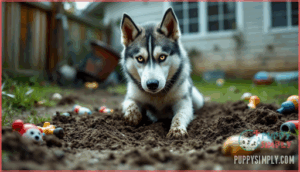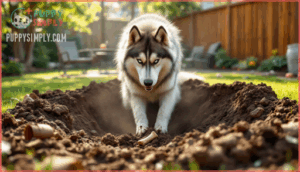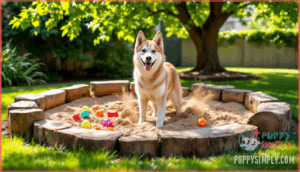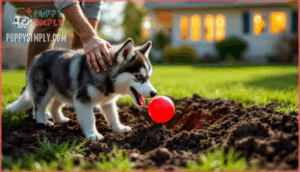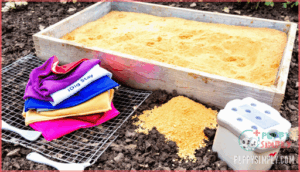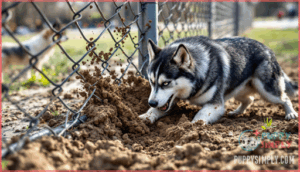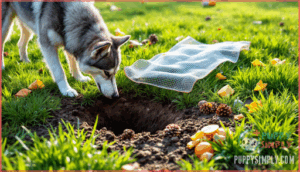This site is supported by our readers. We may earn a commission, at no cost to you, if you purchase through links.
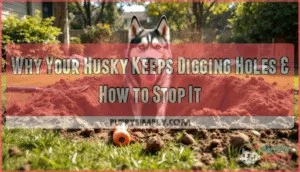
When your backyard becomes a crater-filled disaster zone, it’s rarely random destruction. Most digging stems from five clear triggers: inadequate mental stimulation, pent-up energy from insufficient exercise, attempts to regulate body temperature, natural prey drive, or environmental stressors.
The good news? Once you identify which factor drives your husky’s excavation habit, you can redirect that energy into acceptable outlets. Understanding the root cause transforms this frustrating action from an ongoing battle into a manageable training opportunity.
Table Of Contents
- Key Takeaways
- Why Do Huskies Dig Holes?
- Sudden Digging Behavior Change
- Determining The Underlying Cause
- Effective Tips to Stop Digging
- Ideal Digging Tools
- Preventing Fence Escapes
- Using Deterrents
- Frequently Asked Questions (FAQs)
- Do Huskies dig?
- Why is my husky digging in the backyard?
- Why does my Pet dig a hole?
- Why does my husky dig a sandbox?
- How do I get my husky to stop digging?
- How do I get my husky to dig a sandbox?
- How deep will my husky dig?
- Should I fill in holes my husky digs or leave them open?
- Is my husky digging holes because he is unhappy or anxious?
- Is it normal for huskies to dig holes in the couch or bed?
- Conclusion
Key Takeaways
- Husky digging stems from five primary triggers—insufficient mental stimulation, inadequate exercise (1-2 hours daily needed), temperature regulation instincts, natural prey drive, or environmental stressors—rather than deliberate misbehavior.
- Creating a designated digging area with sand or loose soil and burying toys weekly can reduce unwanted digging by approximately 70% when combined with positive reinforcement within one second of correct behavior.
- Direct supervision with immediate redirection using treats or toys within three seconds of digging onset reduces destructive behavior by up to 60%, making timing critical for successful intervention.
- Preventing fence-line escapes requires multiple reinforcement methods such as burying the lower fence edge 30-60 cm deep, installing coyote rollers (90% effective against climbing), and adding L-footer configurations to discourage tunneling attempts.
Why Do Huskies Dig Holes?
If you’ve caught your husky turning your backyard into a construction site, you’re not alone. This digging habit stems from a mix of natural instincts and unmet needs.
Let’s break down the three main reasons your husky can’t seem to keep their paws out of the dirt.
Boredom
Most often, boredom is your Husky’s way of telling you they’re cognitively understimulated. When your dog lacks mental stimulation, they’ll turn to digging as behavioral substitution—using holes to occupy idle time. Research shows that dogs without puzzle-based activities exhibit 47% higher rates of destructive actions. Social isolation and environmental monotony compound the problem, leaving your understimulated Husky with few outlets. Dogs may also dig due to their natural tendencies as a breed.
Managing Husky boredom requires consistent mental enrichment:
- Hide treats around your yard for scent-based treasure hunts
- Rotate toys weekly to maintain novelty and interest
- Practice short training sessions with new commands daily
- Arrange playdates with other dogs to prevent isolation
Without adequate attention and variety, your Husky will dig simply because there’s nothing better to do.
Lack of Exercise
Beyond boredom, lack of exercise is a primary driver of your Husky’s digging actions. Adult huskies require 1–2 hours of vigorous activity daily to satisfy their breed physiology. Without adequate exercise, excess energy manifests as destructive digging—your dog’s outlet for pent-up stamina.
Insufficient activity duration also triggers impacts like stubbornness and anxiety. Providing adequate exercise through running, hiking, or agility training redirects that energy constructively. As stated in the linked article, regular exercise reduces problematic actions in dogs. Exercise intensity matters: leisurely walks won’t cut it for this high-endurance breed.
Staying Cool or Warm
While exercise matters, your Husky’s digging isn’t always about burning energy. Sometimes it’s about Coat Thermoregulation—their dense double coat traps heat in warm weather and prompts Actions like digging. Soil Temperature drops 5–10°C just 10 cm below the surface, creating a natural cool spot. These Instinctual Roots trace back to Arctic ancestors who burrowed into snow for warmth.
To support your dog’s comfort in varying weather conditions:
- Provide shady areas and cooling mats
- Offer a kiddie pool for staying cool
- Supply insulated doghouses and blankets
- Monitor outdoor time during temperature extremes
- Secure fencing to prevent escape attempts
Understanding the Thermodynamic Efficiency of dug pits helps you address this natural action constructively.
Sudden Digging Behavior Change
When your husky suddenly starts digging after months of good conduct, something’s changed. Routine Disruptions like a new pet or altered schedule can spike digging by 35%. Stress Indicators—excessive panting, pacing—often accompany anxiety-driven digging, especially after owner absence exceeding four hours.
Health Factors matter too: nutritional deficiencies or illness trigger compulsive digging in up to 18% of cases. Prey Detection abilities let your husky hear rodents through soil, while Environmental Triggers like temperature shifts increase digging by 40% in summer.
Don’t ignore these issues—consult a veterinarian to rule out underlying causes.
Determining The Underlying Cause
Before you can tackle the digging, you need to figure out what’s driving it. Your husky isn’t digging just to annoy you—there’s always a reason behind the actions.
Let’s look at two practical ways to identify the real cause.
Observe Behavior
Think of yourself as a detective gathering clues—each observation brings you closer to solving the mystery of your Husky’s digging actions. Start by dedicating just 10–15 minutes daily to watch your Husky outdoors. Notice when digging happens: during hot afternoons, after being left alone, or near specific fence sections. Track emotional signals like pacing, ear positioning, or restlessness that precede the actions. Environmental triggers matter too—temperature shifts, rodent scents, or shaded versus exposed areas influence digging frequency.
Keeping observation logs for at least seven consecutive days establishes reliable patterns. Record when, where, and how long each digging episode lasts. This data-driven approach to understanding Husky actions problems helps you identify whether boredom, thermoregulation, or escape attempts drive the digging actions, setting the foundation for targeted intervention methods and successful modification.
- Track timing patterns – midday heat, post-meal energy, isolation periods
- Document physical cues – pawing intensity, focused sniffing, repetitive circling
- Note location preferences – fence lines, shaded spots, previously disturbed soil
Consult a Veterinarian
Sometimes the answer isn’t in training techniques or backyard detective work—it’s hiding in your Husky’s health. Consulting a veterinarian becomes essential when digging conduct changes suddenly or persists despite environmental adjustments. A thorough medical diagnosis can uncover pain from arthritis, anxiety disorders, or skin irritation from allergies that drive compulsive digging.
Veterinary care includes physical exams, blood work, and behavioral assessments to rule out conditions like hypothyroidism or neuropathic pain. Your vet might recommend pain management with anti-inflammatory medications or behavioral therapy paired with pheromone treatments for stress-related cases. Addressing underlying causes of digging through health checks protects your Husky’s wellbeing and stops the cycle before it damages their paws or your peace of mind.
- Sudden conduct shifts warrant immediate evaluation to exclude medical triggers
- Persistent digging beyond two weeks suggests pain or anxiety requiring professional intervention
Effective Tips to Stop Digging
Once you’ve identified why your husky digs, you can take practical steps to redirect this habit. The key is working with your dog’s natural instincts rather than against them.
Here are two proven strategies that address the root causes we’ve covered.
Provide a Digging Area
Creating a designated digging area in your yard can reduce unwanted digging by about 70% when paired with positive reinforcement. Set up a digging pit using sand or loose soil in a partially shaded spot—this keeps the temperature 6–8°C cooler and makes it inviting for your Husky. Bury toys or treats weekly to maintain interest and guide your dog to this controlled digging zone with praise and rewards.
Here’s a quick setup guide:
| Dig Area Design Element | Recommendation | Purpose |
|---|---|---|
| Pit Size | 0.9–1.5 meters wide, 0.3–0.45 meters deep | Provides adequate space for natural digging activity |
| Fill Material | Fine sand or loose soil | Prevents paw injuries and encourages engagement |
| Boundaries | Logs or garden edging | Visually reinforces the designated digging spot |
| Maintenance Schedule | Replace substrate every 3 months | Maintains hygiene and sustained interest |
Consistent redirected digging training teaches your Husky where digging is acceptable. Reward-based methods show 90% retention in learning boundaries, while supervised digging sessions fulfill roughly one-third of your dog’s daily energy needs. With proper digging pit maintenance and regular updates to buried enrichment items, you’ll satisfy your Husky’s instincts while protecting your yard.
Supervise and Divert Attention
Catching your Husky mid-dig and redirecting their focus is the most effective digging prevention strategy—studies show direct supervision reduces destructive actions by up to 60%. Supervise outdoor time closely and divert attention immediately when digging starts using a squeaker, treat, or favorite toy. Positive reinforcement within one second of stopping strengthens consistent training habits.
Supervising and diverting attention works best when you intervene within three seconds—timing matters for stopping Huskies from digging effectively.
Key supervision techniques:
- Redirect attention proactively: Use audible cues or treats before digging intensifies to interrupt the action early.
- Reward calm demeanor: Reinforce non-digging moments during supervised sessions to build lasting habits through positive reinforcement.
Ideal Digging Tools
You can’t stop your husky from having powerful digging tools—their sturdy paws, webbed toes, and thick nails evolved for tearing through snow and frozen ground. But you can give them better places to use these natural abilities. Digging toys like the iDig Stay (launched in 2021) use layered fabric flaps to hide treats, satisfying your dog’s foraging instincts indoors.
For outdoor options, sandbox solutions work exceptionally well—a 4-by-6-foot box filled with 10 inches of clean sand costs about $20 and can reduce unwanted yard digging by 60%. Physical barriers like galvanized wire mesh prevent fence-line digging, while enrichment tools such as puzzle feeders keep your husky mentally engaged.
When you create a designated digging spot filled with loose sand or soil, you’re not fighting your dog’s digging actions—you’re simply redirecting it somewhere appropriate.
Preventing Fence Escapes
Your husky’s fence line acts like an open invitation unless you reinforce it properly. Burying the lower fence edge 30–60 cm into the ground prevents tunneling in over 80% of digging cases, creating a solid foundation for fence security.
For climbers, coyote rollers along the top reduce escape attempts by up to 90%, while lean-in extensions angled inward deter 85% of climbing dogs. You can also install L-footer configurations that extend horizontally from the base—these digging barriers cut escapes by roughly 70%.
Wire mesh buried at least 30 cm deep or a 60 cm gravel strip along the fence makes digging uncomfortable and less rewarding. Combining multiple methods works best for husky escape prevention. Add monitoring systems or motion detectors to catch escape actions early, and inspect your fences every two weeks to maintain containment effectiveness above 90%.
Using Deterrents
Sometimes the best way to stop your husky from digging is to make the experience less rewarding. If your dog keeps returning to the same spots, strategic deterrents can shift that conduct.
Here are two practical methods that work without harsh correction.
Bury Feces
One unconventional method draws on your Husky’s natural aversion: burying feces in her favorite digging spots. Dogs instinctively avoid soiling their den areas, so encountering waste signals that zone as undesirable.
This approach works best alongside positive alternatives—provide a designated digging area, increase exercise to burn excess energy, and redirect her attention with toys.
Understanding why Huskies dig holes helps you get to the source of the problem rather than just the symptom, creating lasting change through patience and consistency.
Set Up Sprinklers
Motion-activated sprinklers offer another effective digging deterrent. These devices use infrared motion sensors to detect your Husky within a 12 to 40-foot range, then release a two-second spray that startles without harming.
Position sprinklers near problem zones where Huskies dig holes most often, adjusting water pressure to create a gentle but surprising burst. Timer settings help you target peak activity periods—dawn and dusk work well.
Check batteries monthly for reliable system maintenance, and consider pairing this method with positive reinforcement to reduce repeat digging by over 50% within weeks.
Frequently Asked Questions (FAQs)
Do Huskies dig?
Yes, huskies dig frequently. This breed predisposition stems from their ancestral instincts and physical build. Even husky puppies start digging early, using their sturdy paws to explore.
While digging might seem frustrating, it offers benefits like mental stimulation for your husky.
Why is my husky digging in the backyard?
Ironically, the breed traits that make huskies so appealing—boundless energy and ancient instincts—are the root cause behind your yard damage.
Your husky’s digging urges stem from boredom, insufficient exercise, temperature regulation, or their natural digging instinct seeking outlets, making early prevention essential to address the underlying cause.
Why does my Pet dig a hole?
Your husky digs holes due to instinctual root causes and breed predisposition. Reasons huskies dig holes include underlying anxiety, attention seeking, environmental triggers, and animal instincts.
Huskies dig holes naturally—their digging instinct stems from survival actions passed through generations.
Why does my husky dig a sandbox?
Your husky might dig in a sandbox because the loose material makes digging easy and satisfying. A designated digging area with sand or soft soil redirects this natural instinct.
Choose a shaded location, keep it clean, and bury toys to encourage proper use.
How do I get my husky to stop digging?
Stopping husky digging requires a combination of training techniques and redirecting instincts toward designated digging areas.
Increase your dog’s exercise regimen and provide mental stimulation to prevent unwanted actions.
If the problem persists, consider professional help.
How do I get my husky to dig a sandbox?
You might think luck alone steers your husky toward a designated digging area, but positive reinforcement makes it happen.
Bury treats or toys in a sandbox filled with soft sand, then guide your husky there and reward enthusiastic digging immediately.
How deep will my husky dig?
There’s no set depth—it varies based on paw strength, soil composition, and digging purpose. Some huskies scratch shallow holes for cooling, while others burrow deeper when chasing prey or attempting escape.
Breed variation and environmental factors also influence how far your husky will dig.
Should I fill in holes my husky digs or leave them open?
Filling in digging holes is like putting a band-aid on a broken leg—it won’t teach your Husky anything or address safety concerns.
Filling holes without addressing the root cause is ineffective and ignores your husky’s underlying needs
Instead, identify why Huskies dig holes: boredom, prey drive, or lack of exercise.
Redirect digging actions to a designated area with buried toys and treats, providing alternative solutions while minimizing environmental impact.
Is my husky digging holes because he is unhappy or anxious?
Yes, digging can signal anxiety or unhappiness in your husky. Separation anxiety, stress triggers, and attention seeking often manifest as destructive actions. Observe when digging occurs—does it happen when you’re away or during routine changes?
Addressing anxiety in Huskies requires identifying the underlying cause through patterns and meeting their emotional needs consistently.
Is it normal for huskies to dig holes in the couch or bed?
When your husky turns your couch into a dig site, it’s not typical—but it happens. This destructive conduct usually signals boredom, insufficient exercise, or anxiety.
Boost physical activity, offer chew toys, and provide mental challenges through training. If digging persists, consult a veterinary behaviorist.
Conclusion
Your backyard may look like a construction site, but understanding the most likely reasons your husky keeps digging holes transforms frustration into actionable solutions. Whether your dog seeks mental stimulation, temperature regulation, or an outlet for prey drive, each hole reveals a specific unmet need.
Get to the bottom of the underlying cause through designated digging zones, adequate exercise, and environmental modifications rather than punishment alone. Redirect that Arctic-bred determination into acceptable actions, and you’ll preserve both your lawn and your bond with your husky.

